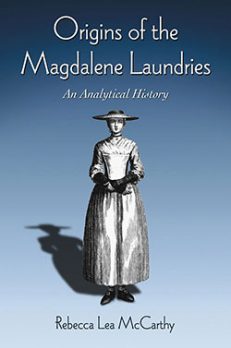Origins of the Magdalene Laundries
An Analytical History
$39.95
In stock
About the Book
The convents, asylums, and laundries that once comprised the Magdalene institutions are the subject of this work. Though originally half-way homes for prostitutes in the Middle Ages, these homes often became forced-labor institutions, particularly in Ireland. Examining the laundries within the context of a growing world capitalist economy, the work argues that the process of colonization, and of defining a national image, determined the nature and longevity of the Magdalene Laundries. This process developed differently in Ireland, where the last laundry closed in 1996. The book focuses on the devolution of the significance of Mary Magdalene as a metaphor for the organization: from an affluent, strong supporter of Jesus to a simple, fallen woman.
About the Author(s)
Bibliographic Details
Rebecca Lea McCarthy
Format: softcover (6 x 9)
Pages: 269
Bibliographic Info: 22 photos, notes, bibliography, index
Copyright Date: 2010
pISBN: 978-0-7864-4446-5
eISBN: 978-0-7864-5580-5
Imprint: McFarland
Table of Contents
Preface 1
Introduction 7
PART ONE: MARY MAGDALENE AND THE RISE OF MAGDALENISM
One—Mary Magdalene and the Mother Mary 17
Two—The Rhetorical Framing of the Magdalene and Women in the Early Middle Ages 40
Three—Medieval Prostitution, Regulation, and Repentance 64
PART TWO: THE STATE, COLONIZATION, AND THE FEMALE AS CITIZEN
Four—Ancient Irish Law and Women’s Status in Precolonial Ireland 93
Five—The Colonization of Ireland and Her Women 113
Six—The Rise of the Irish Magdalene Laundries 135
Seven—The Rise of the English Magdalenes and the Magdalen-House 168
Eight—The Twentieth Century Magdalene Laundries 196
Chapter Notes 219
Bibliography 247
Index 255






